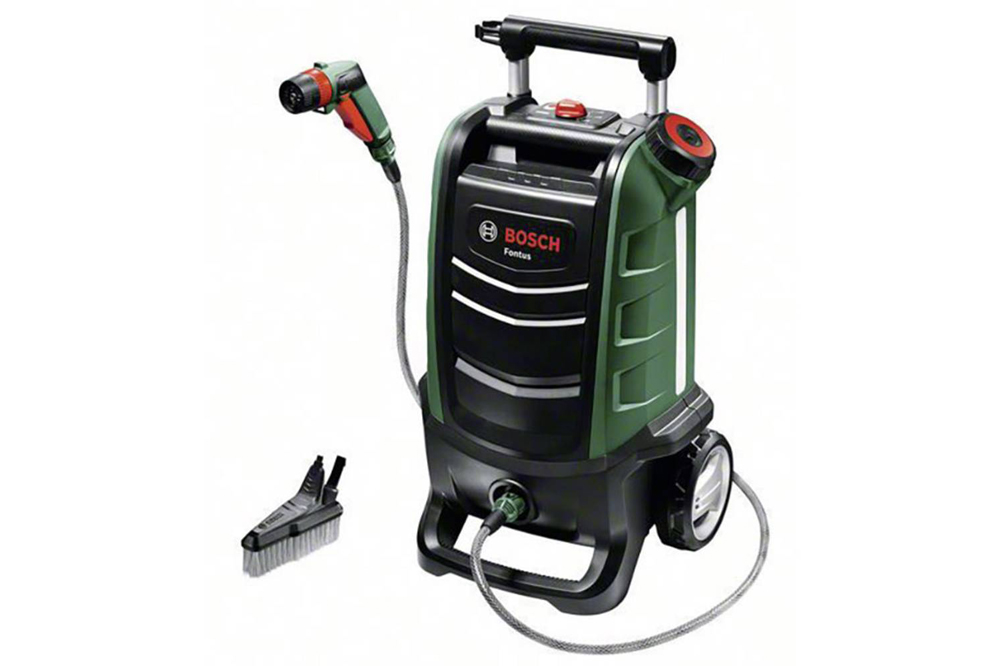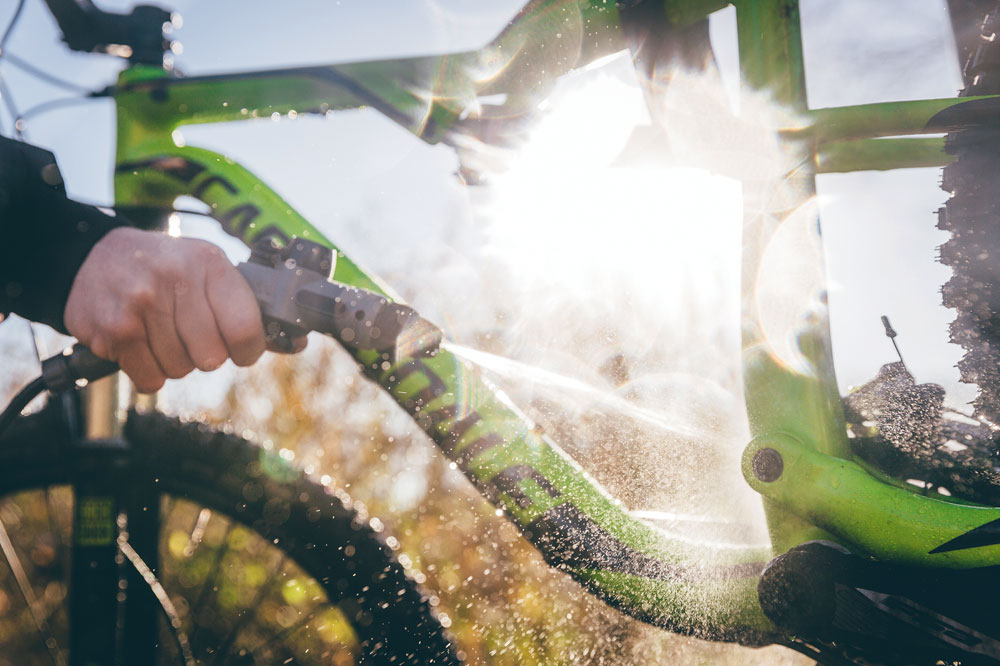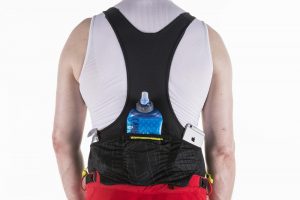Most winter rides end up in an remote car park with no hosepipe or jet wash to hand, but with the latest and greatest portable washers, that's no longer a problem when it comes to cleaning your bike.
Washing your bike isn’t the chore it once was. The latest generation of mobile pressure washers combine powerful motors with the rechargeable batteries to let you blast away the filth immediately after a ride, before it has a chance to bake-on.
If you’re pushed for time, the best deals for our recommended mobile pressure washers are in the quick links below. Otherwise, scroll down to find out more about the best mobile pressure washers we’ve tested and why we’ve rated them.
Best mobile pressure washers – quick list
- Best overall mobile pressure washer – Ryobi 18V One+
- Best budget mobile pressure washer – Worx Hydroshot

The Ryobi Cordless Power Washer is a great product for winter mountain biking, with good power and great battery capacity
1. Ryobi 18v One+ Cordless 22bar Power Washer Kit
Best mobile pressure washer for battery life
Weight: 2.66kg | Pressure: 22 bar/320psi | Rating: 9/10
Reasons to buy:
- Well made with a great tactile gun and solid base
- Easy to use – all the parts click together nicely
- Very good cleaning power and water volume
- Great battery size, and great value too
Reasons to avoid:
- Heavy to use thanks to the big battery
- Lack of accessories included in the price
Like its great rival, the Worx Hydroshot, the Ryobi is a cordless unit that runs off its own 4.0Ah battery, which is the biggest we’ve found on any mobile washer. It’ll suck up water from any source you can find, from the tap at home to a bucket you’ve brought with you (or indeed a stream, muddy puddle or even a drinks bottle).
The unit is shaped like a nail gun, and weighs about the same too, meaning after blasting mud off your bikes you’ll need a sit down. There are three pressure settings accessed by turning the nozzle at the end of the lance: a really useful rinse mode, a concentrated 15º spread and a kinda useless Turbo. The Ryobi is very powerful, with a 22bar pressure and a big water delivery output of 182 litres per hour. That means it’s a match for any muddy bike, and you can blast filth off them for over half an hour and still have enough juice for the next cleaning session. The only limiting factor then is how much water you can take with you, and the strength of your own arm. Quite simply, the Ryobi is the best mobile pressure washer we’ve tested.
Read our full review of the Ryobi 18v One+ Cordless 22bar Power Washer Kit

The Worx Hydroshot is powerful, lightweight and its super-long 10m hose makes it easy to dip into a water source
2. Worx Hydroshot Portable Pressure Cleaner
Best overall portable pressure washer for mountain bikes & best value pressure washer
Weight: 1.85kg | Pressure: 25 bar/360psi | Rating: 10/10
Reasons to buy:
- Compact and cordless, well built and easy to use
- The most powerful battery powered washer out there
- Great water flow rate and multiple spray settings
Reasons to avoid:
- You do have to lug your own water about
- Battery isn’t the biggest, limiting you to washing one or two bikes
The Worx Hydroshot is a fantastic mobile pressure washer – powerful, lightweight and easy to use. Like the Ryobi, it doesn’t come with its own water supply, instead you’ll need to use the long 10m hose to dip into a water source like a stream. Some kits come with a folding bucket to make this easier, but you’ll need a jerry can of some sort to carry the water without it leaking everywhere.
The Worx comes with its own lithium ion battery, which can also be used on other Worx cordless power tools. With a run time over 20 minutes, there’s enough juice to do two bikes, and the pressure is ideal for a mountain bike, at a whopping 25bar. Just like the Ryobi, there are three pressure settings, and Worx adds five different spray patterns from high pressure to gentle misting so it’s easy to avoid blasting your bearings into the bin. The Worx is one of the best out there, it delivers more power than anything else and it comes with plenty of accessories. If there’s one complaint it’s the battery is small, but you can always buy a second one if you’re worried about running out of juice.
Read our full review of the Worx Hydroshot portable pressure washer.

The Go P40 might be small but its flow rate and power are excellent, and it’ll shift anything from mud-encrusted tyres to moss on your driveway
3. Ava Pressure Washer Go P40 Pressure Washer review
Best pressure washer for high power
Weight: 6.3kg | Pressure: 120 bar/1,740psi | Rating: 8/10
Reasons to buy:
- Great power and water flow rate for proper cleaning
- Stable and easy to store, good warranty support
Reasons to avoid:
- Fiddly accessory storage
- 10-year warranty doesn’t cover everything
- Not truly portable – needs mains power
If you want your pressure washer to be running in 10 years time, the Go P40 from Ava of Norway is the one to get. It’s committed to Europe’s Right to Repair scheme, which means you’ll find parts for it into the 2030s, and everything from the gun to the motor can be stripped down and serviced. It comes with a 10 year warranty too, just make sure you service it after 5 years to claim though.
OK, so the Go P40 isn’t strictly a mobile pressure washer as you’ll need to run it off a mains power supply, but it’s diminutive size and light weight means you could easily travel with it and nab some power from a friendly bike shop, cafe or B&B. For such a small unit the Go P40 is very powerful, kicking out 120 bar of water pressure. That’s too much for your e-bike or indeed your linkages and hubs, but you can turn that down and make the waterjet less concentrated. This makes it ideal for stripping mud from your tyres, but sensitive enough for tickling around your bike’s motor housing. It’ll do your patio too, if you can be bothered.
Read our full review of the Ava Pressure Washer Go P40 L.

The Bosch Fontus caries its own water and power, with a 10l reservoir and 18v
4. Bosch Fontus 18v Cordless Washer
Best pressure washer for long run time
Weight: 7kg | Pressure: 20 bar/290psi | Tank capacity: 15L | Rating: 9/10
Reasons to buy:
- All-in-one solution with great accessory storage
- Powerful spray and multiple patters and power modes
- Good battery life for a mobile unit, at 2.5Ah
Reasons to avoid:
- Heavy when filled, and hard to lift
- Not as portable as the Worx Hydroshot
- Battery power is excessive, adding cost
The Bosch Fontus doesn’t need a water source like the Worx or Ryobi units, instead it has an internal tank that’ll take 15l of the stuff. This is great if you’re not going somewhere with a handy water source to dip into, but it does mean the full Fontus tips the scales at over 20kg. Still, in the age of e-bikes 20kg doesn’t seem like such a struggle anymore, when you’re lifting it out of the boot.
The Fortus is a really neat design, you can stash the hose, gun, brush head and battery pack in the unit itself, and it feels really solid and well made. The gun has four different spray patterns and three power modes, so you can tailor it for different parts of your bike.
Power is great on the Fortus – at 20bar it’s technically punier than the Worx or Ryobi, but in use it seemed to outclass both of them. The flow rate is good too, and the battery will run for more than an hour before you need to charge it, so really it’s overkill for the amount of water in the reservoir.
Read our full review of the Bosch Fontus 18v Cordless Washer.

The Muc-Off Pressure Washer Kit includes 2l of cleaner, careful where you point that thing though as it’ll turn your garden into Santa’s grotto
5. Muc-Off Pressure Washer Bicycle Bundle
Best pressure washer for looking after your e-bike
Weight: 11.3kg | Pressure: 70 bar | Tank capacity: n/a | Rating: 7/10
Reasons to buy:
- Well made, nicely packaged and robust
- Multiple spray modes and patterns
- Good for protecting your bearings or e-bike
Reasons to avoid:
- Not powerful enough compared to other plug-in washers
- Needs a water source and mains power, so not really portable
The Muc-Off Pressure Washer is deliberately designed as low pressure model, the idea being it’ll better look after your e-bike and grease in your bearings. We tried it out by blasting a Shimano hub at point blank range; it passed and we’re reasonably confident that it won’t destroy the internal workings of your bike.
It’s a well made washer too, clad in the familiar black and pink Muc-Off livery there are places to stash all the relevant accessories. You get a high pressure lance for cleaning the patio etc, a motorcycle attachment with slightly less oomph, and a bike lance with much less power and a snow foam attachment. We love the snow foam reservoir, it’ll turn your bike into an Ibiza foam party if you’re not careful, and it proved useful for prewashing.
The Muc Off Pressure Washer is a good product and comes exactly as described, it’s ideal for people who’re anxious to maximise the life of their bike. The only trouble is, a regular garden hose with its basic low pressure can do the job too.
Read our full review of the Muc-Off Pressure Washer Bundle

The Muc-Off Mobile Pressure Washer Starter Bundle has the power and the battery life, but the lack of any sealing means you need a secondary water carrying solution.
Other mobile pressure washers worth considering
The latest model we’ve tested that hasn’t made the cut onto this list is the Muc-Off Mobile Pressure Washer. On paper it looks like the perfect all-in-one solution, with a really powerful lance complete with multiple attachments (the bike head being lower power to keep those bearings safe), a removable and rechargeable battery, and a 20l water tank incorporated into the design. Unfortunately the lid of said tank isn’t sealed or lockable in any way, so you can’t actually use it to carry water with you to the trails. That means you have to double up with a secondary water tank, which is an extra cost and takes up additional space. The Muc-Off unit is really effective aside from that fairly major flaw, with plenty of grunt to wash away the grime. But the price is high and the pointless integrated tank means it falls short of our recommendation.

The compact Mobi V-15 is small enough to keep in the car, but is outdated compared to the latest cordless designs.
Another unit that we tested in the past – and actually rated highly – is the Mobi V-15 Mobile Washer. These all-in-one units are relatively cheap and were really popular before the likes of the Worx Hydroshot and Ryobi arrived on the scene. They come with a decent-sized tank – enough to wash one bike – and use your car battery to power the spray head. And they’re reasonably effective on wet mud, but the spray is nowhere near as powerful as the latest generation of washers, and the fact you have to plug it into your car can be limiting. We’ve also experienced issues with fuses blowing on these units, and they don’t seem to have the reliability of the systems from Worx, Ryobi, and Bosch.

Until recently, portable washers were weak and had a stingy capacity, but new models are good enough to use anywhere.
What to look for in a portable jet wash
So what makes a great mobile pressure washer? Obviously it has to be mobile, meaning it comes with a rechargeable lithium ion battery, so there’s no need to find a powerpoint in the woods, or tap into your car battery. The superior mobile washers have enough juice to run on full power for over 20 minutes. After that it’s all about power and rate of water flow – the higher the better. You can always turn it down by making the jet cover a wider area.
The choices you have to make then are all about battery capacity and whether you want the water stored internally, or in a bucket. The Bosch Fontus keeps it all together nicely and has a big internal reservoir, but it weighs a lot because of that and it arguably less portable because of it. For most riders, a portable unit, like the Ryobi or Worx, combined with a jerry can for carrying water, is the best overall solution. Jerry cans can be source from the likes of Amazon quite cheaply.
It’s a tough choice between the Worx Hydroshot and Ryobi washer. The Worx is brilliantly powerful and compact, but the battery life is lacking: while the Ryobi is heavier and harder work, but will go on for days. You could probably even do the car too while you’re at it.
Additionally, it’s worth investing in the best mountain bike cleaning kits too, so you can make sure everything is spick and span. Then you’re going to need some of the best mountain bike chain lube so your drivetrain doesn’t turn orange before your very eyes.
What pressure is safe for cleaning my bike?
While mains powered, mains-water fed pressure washers can kick out a whopping 70-100 bar (1,000-1,400psi) that kind of pressure can be damaging to the precise seals and delicate internals of a modern mountain bike, particularly electric mountain bikes. It’s impossible to say that there is a single safe pressure, as any water ingress is bad news, most bikes will cope with moderate pressure of around 15-20 bar (220-290 psi) as long as you don’t hold it at point blank range at the same spot for a long period of time. However, the IP (ingress protection) ratings can offer a guide. Electrical components, for example, all have to be tested and certified to specific IP ratings. E-bike systems, and even individual components of an e-bike system, vary in rating, but look for IP5 or higher for protection from water jets. IP6 raises the level to protect from powerful water jets, and IP7 has to withstand being submerged in water up to 1m deep. Check the vulnerable components on your bike, and use a pressure washer only if they exceed the relevant rating.
For components like bottom brackets and hubs, there is no IP rating, so how safe is it to pressure wash these areas? The answer is, as always, tricky to pinpoint as it depends on the specific part, the type of pressure washer, the distance from the bike, and the duration of use. But to put give you an idea, we did a little test. We aimed Muc-Off’s bike-specific lance directly at a freshly greased front hub at a distance of 60mm for 60 seconds – something no one is likely to do in the real world. And we found that, while some water had got past the seals, it was not a large amount and the grease was still in place and working as intended. If you have an e-bike, however, all the bike and motor manufacturers recommend avoiding a jet wash altogether and sticking with mains water pressure.

Washing away the good times…
What’s more important: power or water capacity?
Assuming you’re looking for a portable unit, you’ll probably be looking for something you can use immediately after a ride. In this case, power is not the number one consideration, as the mud should be wet enough to wash off without too much effort. But you’ll need a reasonable size water tank (around 10L should suffice), a long enough extension cable if you’re taking power from your car battery and a simple, robust design that lets you assemble and disassemble quickly.
















